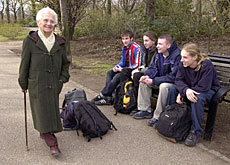|
Senior
citizens put through their paces
Swissinfo,
May 21, 2003
 The scheme aims to keep the
elderly as independent for as long as possible The scheme aims to keep the
elderly as independent for as long as possible
Pro Senectute - the Swiss organisation for the elderly
- has launched a nine-month mental and physical training programme for
senior citizens.
Entitled “Independence In Old Age”, its aim is to
keep the elderly healthy and living independently for as long as possible.
The population of Switzerland is ageing steadily: men
live on average until 77 years old, while women can expect to reach 83.
With people spending more of their lives in retirement, it is in the
interests of the public health system that pensioners remain fit and well,
thereby reducing the burden of medical and care costs.
The Pro-Senectute initiative differs from other programmes for the elderly
in that it combines mental and physical training to improve the memory,
mental ability and movement.
Group skills
Training takes place in groups and is led by specially
trained persons.
Participants learn how to deal better with everyday life, to discover what
skills they have, and develop and preserve these skills.
At the same time, pensioners learn to accept their infirmities and to
adapt their surroundings accordingly: they are asked to consider whether
it would be better for them to move to a flat with lift access, or whether
certain household appliances would make their lives easier.
Memory training is another aspect of the course, with participants shown
how they can compensate for age-related memory loss.
Finally, the physical training component aims to improve coordination
through better muscular movement.
No quick fix
The “Independence In Old Age” programme involves
constant study and practice. Thirty units are taught every week over a
period of nine months.
“In this programme, staying power is required if participants are to
retain what they have learned. In the group, people motivate one another
and make social contact,” said Pro Senectute director Martin Mezger,
highlighting the benefits of the programme at a news conference.
The benefits of the study programme can be experienced
for up to ten years, but it cannot work miracles.
The extent to which the participant’s quality of life improves depends
on both their individual situation and their limitations.
Before introducing the programme nationwide, Pro Senectute is carrying out
pilot projects in various cantons.
The idea is originally the brainchild of the University of Erlangen-Nuremberg
and has been successfully applied in Germany for a number of years.
Copyright
© 2002 Global Action on Aging
Terms of Use | Privacy
Policy | Contact Us
|



